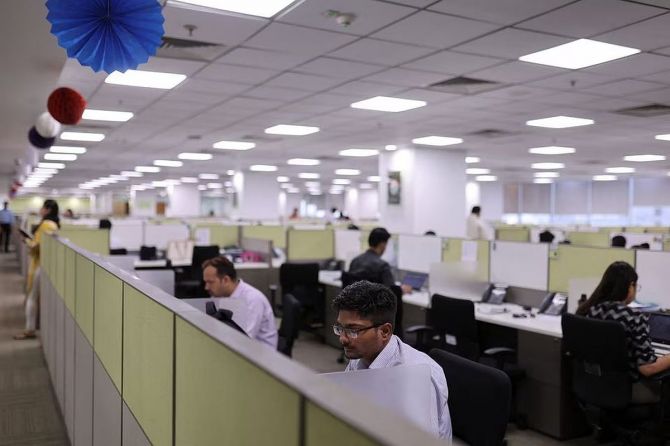BCG and Nasscom's signposts point to 8-9% annual growth through 2030, India's share to take express lane

The July-September quarter results of software companies in the engineering research and development (ER&D) segment were broadly in line with expectations, though there have been cuts in revenue growth guidance.
While results were a mixed bag, and there are cautionary views on the near-term outlook, brokerages and global consulting firms highlight the strong growth trajectory for the sector.
They expect this segment of the software sector to grow by 8–12 per cent going forward.
In a report earlier this month titled Seizing the ER&D Advantage: Frontiers for 2030, global management consultancy Boston Consulting Group and the National Association of Software and Service Companies estimated that global spending in the ER&D segment will grow at 8–9 per cent annually over the 2023–2030 period.
They believe that India’s share will improve from 17 per cent to 22 per cent during this period, while the country’s share of the revenue pie will more than treble from $45 billion in 2023 to nearly $150 billion by 2030.
They expect the software, automotive, and semiconductor sectors to contribute more than 60 per cent of India’s share of ER&D sourcing by 2029-30.
The strong growth trajectory should help the segment maintain its outperformance over the overall software services space.
Kotak Institutional Equities expects the ER&D services market to outpace the information technology (IT) services market and grow by 10–12 per cent over the next few years.
Analysts of the brokerage, led by Kawaljeet Saluja, expect this to be driven by digital engineering spending, higher reliance on external sourcing, either with the captive centre or third-party service providers, as enterprises rush through the development of technology-infused new products, and increased offshoring, given the limited availability of skilled resources on-site.
While in the medium term, listed companies in this space such as L&T Technology Services (LTTS), Cyient, KPIT Technologies, Persistent Systems, and Tata Elxsi should benefit from the strong growth rates, in the near term, the focus will be on the outlook after second quarter (Q2) results, and, more importantly, valuations, which are in the expensive zone.
On the Q2 results front, the largest Indian player in this space, LTTS, had a healthy quarter with sequential constant currency growth at 3.2 per cent, led by 3.8–4.4 per cent growth in transportation and plant engineering.
While deal wins were healthy, the company cut its constant currency growth guidance for 2023-24 (FY24) to 17.5-18.5 per cent from 20 per cent plus earlier.
IIFL Research has maintained an ‘add’ rating due to valuations, with the stock trading at 33x its 2024-25 (FY25) price-to-earnings ratio.
This is at a 20 per cent premium to midcap IT peers and is above its historic average of 15 per cent.
Persistent Systems’ September quarter results were above expectations, with revenue growth at 3.2 per cent sequentially.
Deal bookings with a total contract value of $480 million were its highest ever.
While margins fell 122 basis points (bps) sequentially to 13.7 per cent, the company is looking at expanding the metric by 200–300 bps over the next two to three years through levers such as hiring more freshmen and improving utilisation and efficiencies.
BNP Paribas Research has maintained a ‘buy’ rating, given its strong earnings growth potential of 26–35 per cent in FY25/2025-26.
Tata Elxsi’s Q2 performance was better than estimates both in revenue as well as margin terms.
Revenue growth of 3.4 per cent quarter-on-quarter was led by the transportation vertical on the back of deals in software-defined vehicles.
The company’s client concentration (top 10 clients) has hit the highest levels in the past five years and indicates vendor/pipeline consolidation, says HDFC Securities, which has a ‘sell’ rating.
Elara Securities, on the other hand, has an ‘accumulate’ rating.
The Q2 show indicates the company’s strong top-client relationships and deft margin management, thus validating the breakout ER&D demand led by a focus on strengthening the supply chain and a shift to electric vehicles and software-defined vehicles.
Cyient’s Q2 service revenue growth of 1 per cent was lower than brokerage estimates, dragged down by the connectivity vertical.
The communication vertical is struggling as enterprises have been revisiting their budgets for 5G investment.
Motilal Oswal Research says that Cyient’s services segment is shaping up quite well, with positive momentum in most of its growth engines.
Conversely, other segments are on the verge of recovery and should incrementally contribute to its overall growth in FY24.
It has a ‘buy’ rating on the stock.
KPIT Technologies (Q2 results awaited) focuses exclusively on automotive clients and has strategic partnerships with automakers and Tier-I suppliers.
Kotak Research says that the company has benefited from demand tailwinds in the automotive industry, driven by the accelerated shift towards electric powertrains and increased ‘software-isation’ of vehicles. It has a ‘sell’ rating on the stock, given its expensive valuations.











 © 2025
© 2025